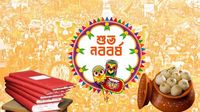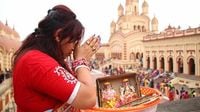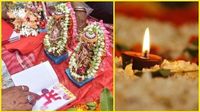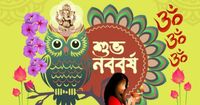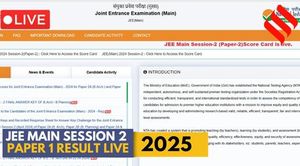As the sun rises on April 15, 2025, Bengalis around the world will gather to celebrate Poila Boishakh, marking the beginning of the Bengali New Year, also known as Noboborsho. This festive occasion, observed with great enthusiasm, is a time for new beginnings, joy, and the embrace of rich cultural traditions.
Noboborsho, which translates to "new year," is celebrated on the first day of the month of Baisakh according to the solar calendar. This year, the Bengali calendar welcomes the year 1432. The significance of this day transcends mere date; it symbolizes a fresh start, filled with hope and aspirations for the year ahead.
In preparation for the festivities, families engage in various traditions. Homes are cleaned and decorated, symbolizing the removal of the old and the welcoming of the new. People don new clothes, often vibrant and colorful, to mark the occasion. As the saying goes, "Morning shows the day," and the first day of the year is particularly special for Bengalis, who look forward to celebrating with loved ones.
On this auspicious day, many perform Mangal Kamana pujas, seeking blessings from deities such as Lakshmi and Ganesh. Worshipping these deities is believed to bring wealth and success for the year to come. According to traditional practices, the auspicious time for these rituals falls within specific periods defined by the Panjika (Hindu calendar). For 2025, the Dwitiya Tithi lasts until 10:56 AM, followed by Tritiya. The Amrita Yoga begins at 7:50 AM, providing an ideal time for worship.
As part of the celebration, heartfelt greetings and wishes are exchanged among family and friends. People share messages of goodwill through social media platforms like WhatsApp, Facebook, and Instagram. Some popular wishes for Noboborsho 1432 include, "May the new year begin with love and laughter!" and "Let every moment of the new year be filled with joy and prosperity!" These messages encapsulate the spirit of the festival, emphasizing new beginnings and the hope for a prosperous year.
One of the most cherished aspects of Noboborsho is the community spirit it fosters. Markets and shopping malls are adorned with decorations, and people flock to buy new clothes and sweets. The atmosphere is filled with excitement and anticipation, as families come together to celebrate the day with traditional foods, music, and dance. The sounds of laughter and joy resonate as people engage in festivities, forgetting past grievances and embracing the happiness of the present.
Throughout the day, various cultural programs are organized, showcasing traditional Bengali music and dance. The celebration is not limited to private homes; public events also take place, drawing crowds eager to participate in the festivities. This year, as always, the streets will be bustling with activity, from colorful processions to vibrant fairs.
Noboborsho is not merely a day of celebration; it is a time for reflection and gratitude. Many Bengalis take this opportunity to express their appreciation for the blessings they have received in the past year while looking forward to the new opportunities that lie ahead. It serves as a reminder to cherish relationships and foster connections with family and friends.
As the celebrations unfold, the essence of Noboborsho lies in its ability to unite people from all walks of life. Regardless of where they may be, Bengalis share a common bond during this time, celebrating their culture and heritage. The festival transcends geographical boundaries, bringing together communities across the globe.
Moreover, the significance of Noboborsho extends beyond personal celebrations. It is a time when many businesses also partake in the festivities, opening new account books and seeking blessings for a successful fiscal year. The tradition of Hal Khata, where businesses clear old debts and start anew, is a practice that reinforces the importance of financial prosperity and ethical dealings.
In recent years, Noboborsho has also become a platform for social and cultural discussions. Many use this occasion to reflect on societal issues and promote positive change within their communities. It is a time to advocate for unity, peace, and harmony, reinforcing the values that bind society together.
This year, as Bengalis celebrate Poila Boishakh, they carry with them the hopes and dreams for a brighter future. The festival serves as a beacon of optimism, encouraging individuals to pursue their aspirations while remaining connected to their roots.
In conclusion, Poila Boishakh is more than just the start of a new year; it is a celebration of life, culture, and community. As families gather to share in the joy of Noboborsho 1432, they are reminded of the importance of love, laughter, and togetherness. May this new year bring happiness, prosperity, and endless possibilities to all.
